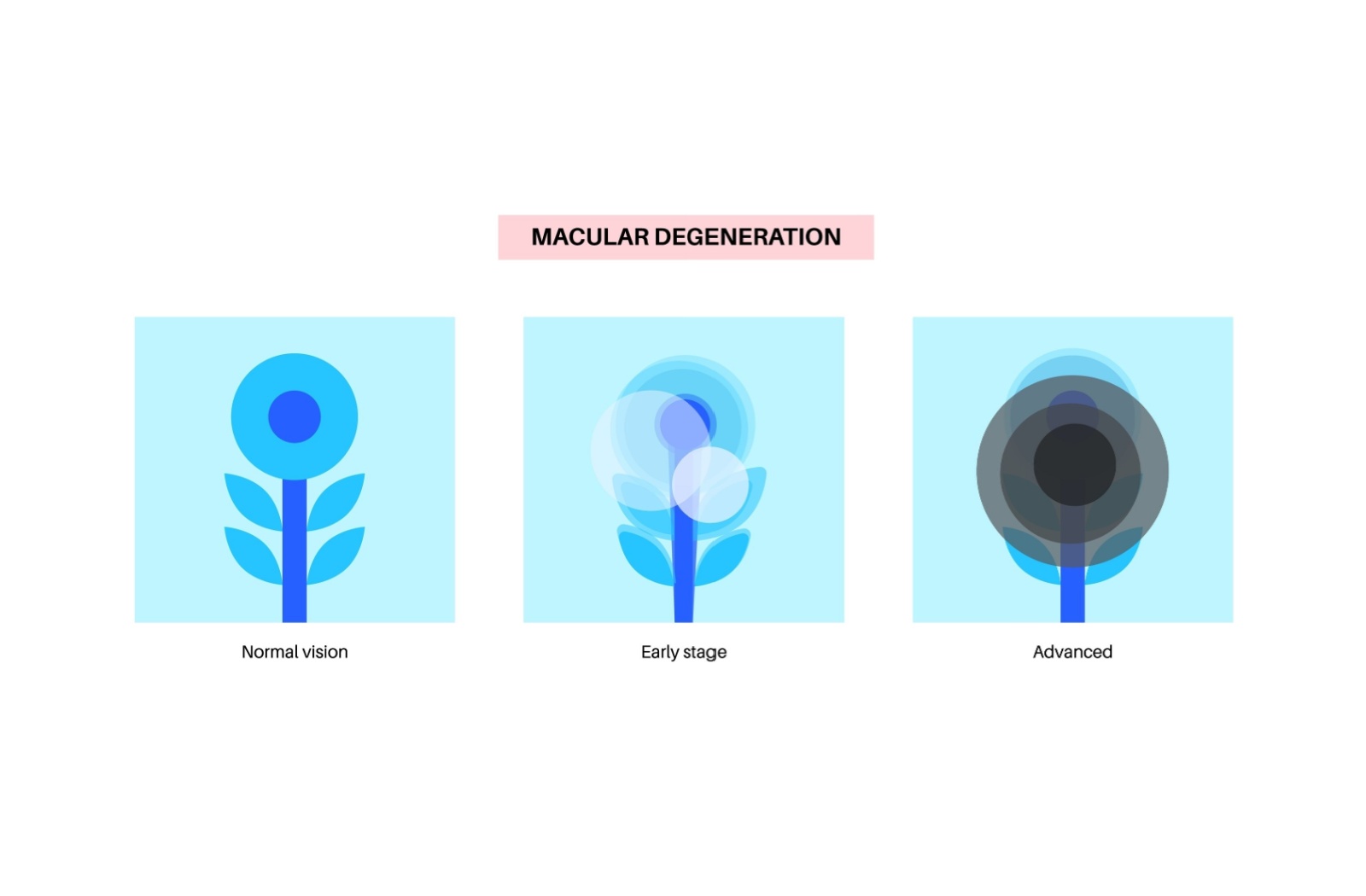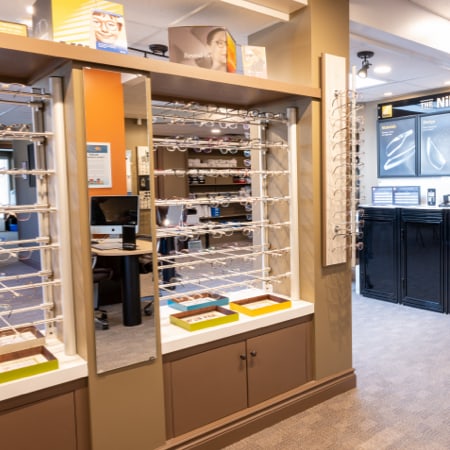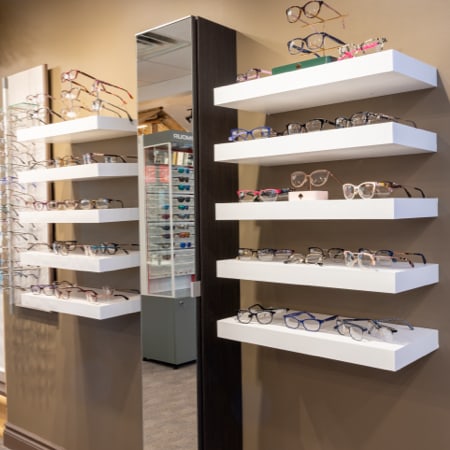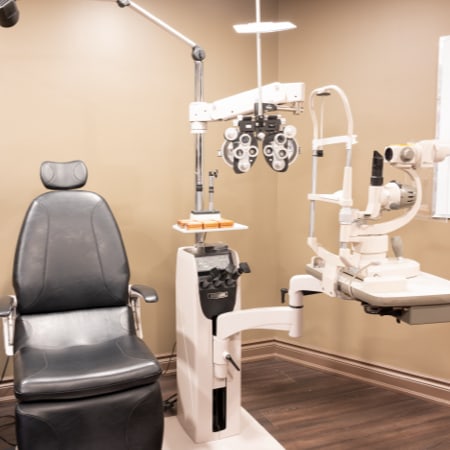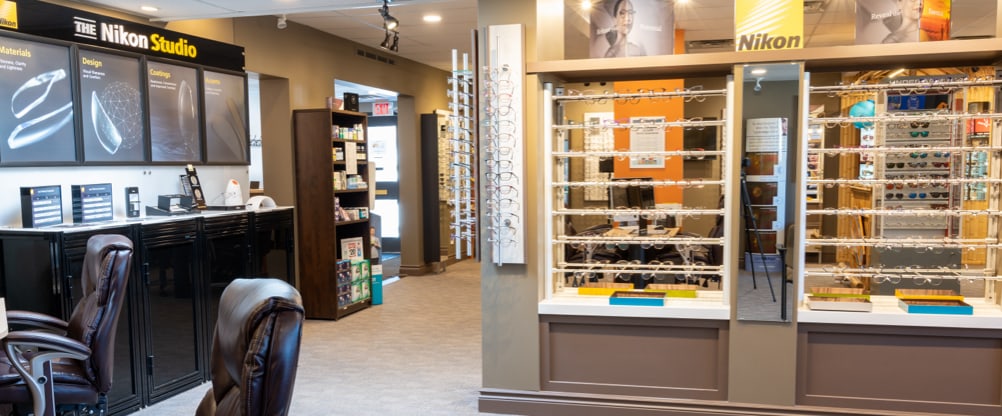Macular degeneration affects your central vision and can make reading, driving, and recognizing faces challenging. The good news is that you have more control over your risk than you might think. Understanding the hereditary factors and prevention strategies helps you take proactive steps to protect your sight.
You can significantly reduce your risk of macular degeneration through proper nutrition, lifestyle changes, eye protection, and regular comprehensive eye exams with your AMD Centre of Excellence at Orillia Optometry.
Know Your Risk Factors for Macular Degeneration
Understanding what puts you at risk helps you make informed decisions about your eye health. Some factors you can’t change, while others respond well to lifestyle modifications.
Age & Family History
Your risk increases significantly after age 55, with most cases developing after 60. If your parents or siblings have macular degeneration, your chances of developing it increase substantially. Learning about age-related macular degeneration helps you understand these genetic connections.
Women face higher rates of age-related macular degeneration than men. While you can’t change these factors, knowing your risk helps you take preventive action early.
Lifestyle Factors You Can Control
Several modifiable risk factors directly impact your likelihood of developing macular degeneration. Smoking doubles your risk by reducing blood flow to your retina and increasing harmful free radicals.
Being overweight, having high blood pressure, and eating a diet high in saturated fats all contribute to poor circulation. When blood doesn’t flow properly to your eyes, your retina doesn’t get the nutrients it needs to stay healthy.
Nutrition & Supplements for Eye Health
What you eat directly affects your eye health. Certain nutrients can help protect your macula from damage and slow progression if you already have early signs of degeneration.
Foods That Protect Your Vision
Leafy greens like spinach, kale, and Swiss chard contain lutein and zeaxanthin — nutrients that act like natural sunglasses for your retina. Try to include these in your meals several times per week.
Fish rich in Omega-3 fatty acids, such as salmon, tuna, and sardines, help reduce inflammation in your eyes. Colourful fruits and vegetables provide antioxidants that fight the free radicals that damage your retinal cells. You can also learn more about vitamins that support eye health.
When to Consider AREDS Supplements
If you have intermediate macular degeneration or a strong family history, specialized vitamin formulations can help slow progression. These supplements contain specific combinations of vitamins C and E, zinc, copper, and carotenoids.
Your Orillia optometrist can evaluate whether these supplements are right for you. They can also recommend the proper dosage based on your individual risk factors and current eye health.
Lifestyle Changes That Make a Difference
Small changes in your daily habits can have a big impact on your long-term eye health. These modifications help improve circulation and reduce oxidative stress on your retina.
Stop Smoking Now
Smoking is the single most modifiable risk factor for macular degeneration. The toxins in cigarettes damage blood vessels in your eyes and reduce the oxygen and nutrients reaching your retina.
Even if you’ve smoked for years, quitting now can slow the progression of early macular degeneration. Your circulation begins improving within weeks of stopping.
Maintain Healthy Blood Pressure & Weight
High blood pressure damages the tiny blood vessels in your retina over time. Keep your blood pressure in a healthy range through diet, exercise, and medication if prescribed by your doctor.
Extra weight often comes with higher blood pressure and increased inflammation throughout your body, including your eyes. Even modest weight loss can help improve your circulation.
Stay Physically Active
Regular exercise improves blood flow throughout your body, including to your eyes. Aim for at least 30 minutes of moderate activity most days of the week.
Activities like walking, swimming, or cycling can help lower your blood pressure and maintain a healthy weight. These benefits directly support your retinal health.
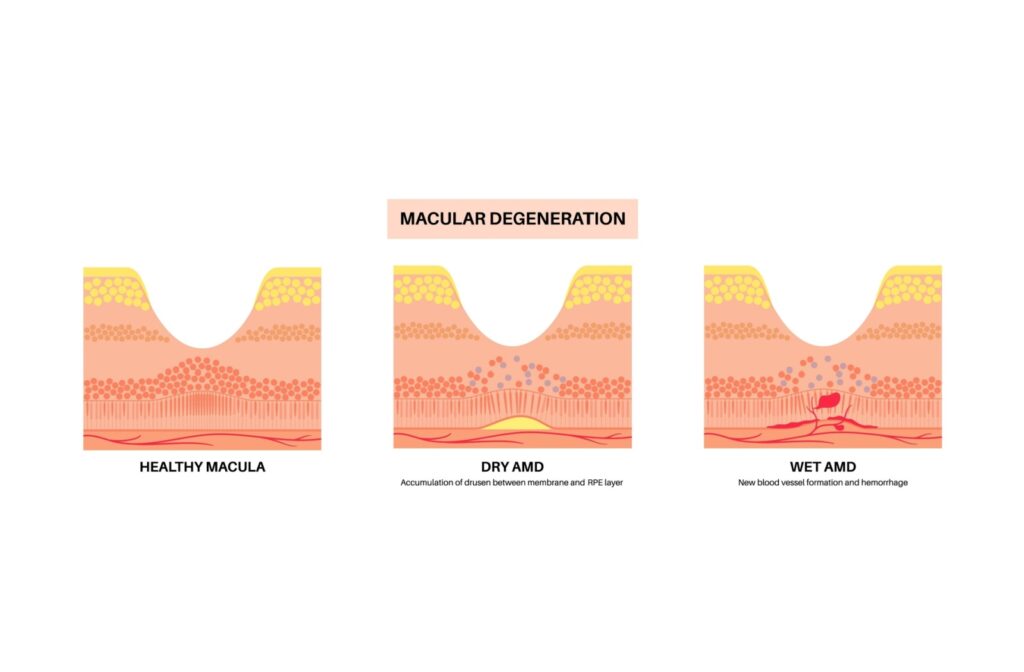
Protect Your Eyes from Daily Damage
Environmental factors contribute to retinal damage over time. Simple protection strategies can reduce your cumulative exposure to harmful elements. Understanding UV damage impacts helps you make informed protective choices.
UV Protection
Ultraviolet (UV) radiation from sunlight can contribute to gradual retinal and ocular surface damage. Wearing sunglasses with 100% UV protection shields your eyes from both UVA and UVB rays. Choose sunglasses labeled “UV 400” for complete coverage, and pair them with a wide-brimmed hat for extra protection.
At Orillia Optometry, you’ll find a curated selection of sunglasses designed to protect your vision and support long-term eye health.
Blue Light Awareness
Digital screens emit blue light, which can contribute to visual fatigue and eye strain for some people. While research on blue light’s long-term effects is still developing, many patients find blue light filtering lenses improve comfort during extended screen use.
Your Orillia Optometry team can help determine whether this type of lens would benefit you and share other simple ways to reduce digital eye strain, such as taking regular breaks and adjusting your screen brightness.
Early Detection Through Regular Eye Care
Regular eye exams are your most powerful tool for preventing vision loss from macular degeneration. Early detection allows for intervention before you notice any symptoms.
Comprehensive Eye Exams in Orillia
Annual comprehensive eye exams can detect early signs of macular degeneration years before you experience vision changes. During these exams, your optometrist examines your retina for signs of drusen deposits or pigment changes.
At Orillia Optometry, advanced diagnostic technology allows for a detailed evaluation of your eye health, helping identify potential risks and guide proactive care.
Advanced Testing Options
Optical coherence tomography (OCT) scans provide detailed cross-sectional images of your retina. These scans can detect subtle changes in your macula before they affect your vision.
Your exam may also include an assessment of your risk for age-related macular degeneration (AMD), taking into account your family history, lifestyle habits, and current eye health. This personalized approach helps guide proactive steps to protect your vision over time.
Monitor Your Vision at Home
An Amsler grid is a simple tool you can use at home to monitor your central vision. Checking it occasionally—especially if you’re at higher risk for macular degeneration—can help you notice changes like wavy lines, dark spots, or blurriness that may indicate retinal changes.
If you observe any distortions or new symptoms, contact your optometrist as soon as possible. Early evaluation allows for timely management and better long-term outcomes.
Preventing macular degeneration involves more than one step—it’s a combination of healthy lifestyle choices, regular eye exams, and proactive care. Our team at Orillia Optometry provides personalized AMD risk assessments and tailored prevention strategies to help protect your sight.
Don’t wait for vision changes to appear—book your comprehensive eye exam today and take a proactive approach to maintaining lifelong vision health.

